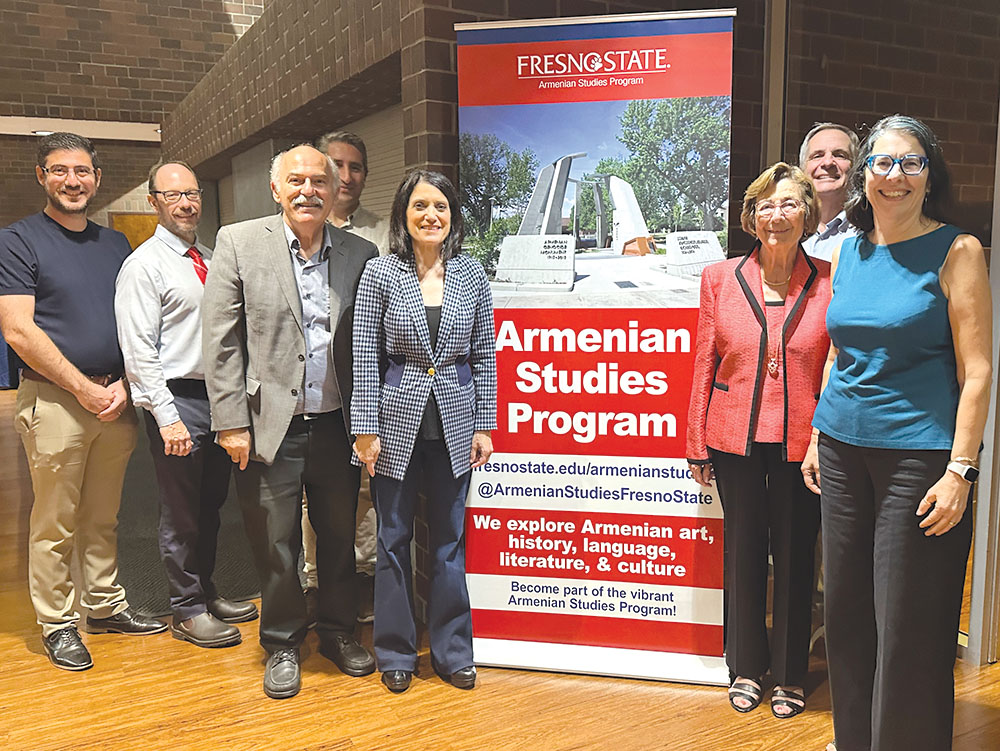
Ani Sargsyan
Staff Writer
“New families came into being, and a stable foundation was established for future generations…” narrates Gov. George Deukmejian in the film “Strangers in a Promised Land.”
On Friday, September 20, the Armenian Studies Program screened the remastered “Strangers in a Promised Land,” directed by J. Michael Hagopian and produced in 1982. Following the screening, Dr. Carla Garapedian and Prof. Barlow Der Mugrdechian led a discussion with the standing-room only audience members.
The evening’s screening was co-sponsored by the Armenian Film Foundation (AFF) and the National Association for Armenian Studies. AFF board chairman Jerry Papazian, treasurer Dr. Carla Garapedian, and board member Dr. Silva Karayan were in attendance. A reception was held in the University Business Center Gallery, preceding the showing of the film.
This story of the Fresno Armenian community spans a period over 100 years. The newly remastered film, sourced from the original 16mm print, depicted the universal experience of immigration, the overcoming of adversity, discrimination, and the achievement of success by Fresno Armenians. It tells the story of the earliest Armenians in Fresno, including the Simonian brothers, the Sinanian family, the Seropians, the Normarts, the Bedrosians and the Pakchoians who became leaders in the raisin industry, alongside artists like William Saroyan and Varaz Samuelian.
In 1883, Fresno was a dusty western town, although everything changed in September of that year. A group of 43 Armenians from Marsovan, Turkey arrived in Fresno – the first group of settlers to come directly to California. By around 1885, there was a steady trickle of Armenians who heard reports of Fresno being a “Garden of Eden” and having “grapes the size of eggs and watermelons the size of boats.” Armenians would soon become the dominant economic group in the valley.
Their hard work and perseverance would lead them to great achievements. Immersed in the agricultural industry and business, Armenians were able to create something unique for themselves.
The film mentions many of the “firsts” in the Armenian community of Fresno, including the culturally significant First Armenian Presbyterian Church built in 1897, and the Holy Trinity Armenian Apostolic Church which was built in 1900, then rebuilt after a fire, becoming the focus of Armenian migration to the “Armenian Town” in 1914. This later area became known as “Little Armenia,” where famous writer William Saroyan grew up and went to school.
Armenians faced prejudice and discrimination and many dropped the “ian” from their name. Others, in response to discrimination, began forming their own groups and organizations, such as the Triple X Fraternity in 1918 and the Armenian-American Citizens’ League. One of the most significant achievements of the first generation was that they were able to provide educational opportunities for their children by sacrificing their own luxuries and comfort.
The Armenian community that gathered in the University Business Center at Fresno State was met with familiar faces on the screen.
Many individuals who appeared in the film were present in the audience and could find friends and family members reflected on the screen.
It was a surreal experience for everyone to unlock the memories of the past, and compare it to the present-day Armenian community in Fresno.
This film serves as a reminder of the first Armenians who sacrificed so much so that their future generations would be able to have opportunities they never had.
“Strangers in a Promised Land” is a true story of hope and resilience, capturing the journey of an Armenian community that not only overcame adversity but thrived in the process.
 Hye Sharzhoom Armenian Action
Hye Sharzhoom Armenian Action